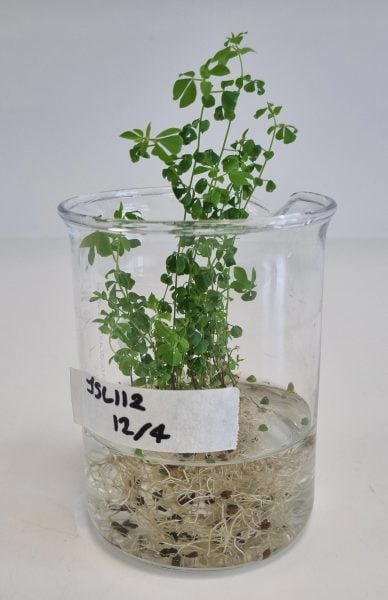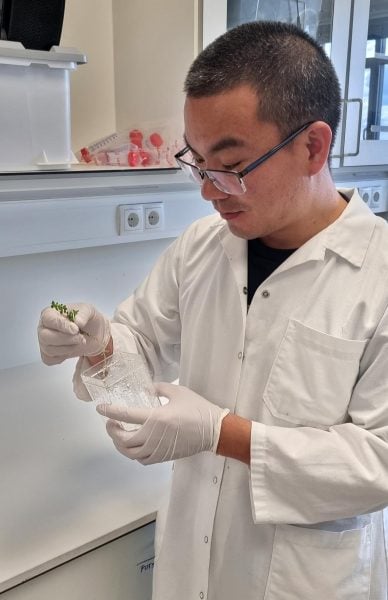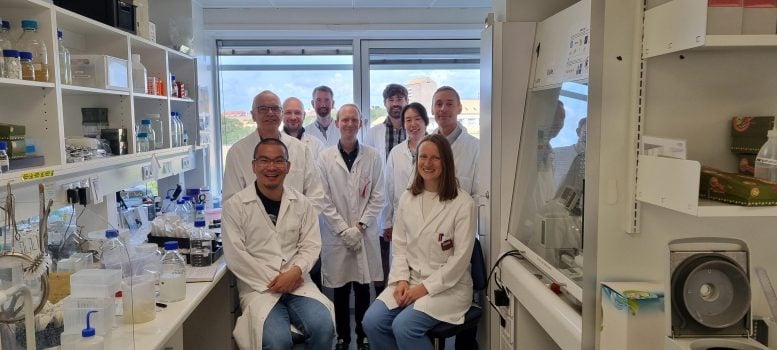
Researchers have found that zinc significantly influences the nitrogen fixation process in legumes, a discovery that could transform legume-based agriculture.
Climate change, drought, increased temperature, and other stressors challenge agricultural sustainability. Researchers have now made an unexpected discovery: zinc plays a pivotal role in the plant response to abiotic stress. This groundbreaking discovery not only sheds light on the intricate mechanisms of plant growth but also holds promise for revolutionizing crop resilience, especially in legume-based agriculture.

Discovery of Zinc’s Role in Nitrogen Fixation
Scientists have uncovered a vital role for zinc in the nitrogen fixation process of legumes. This discovery, paired with insights into the transcriptional regulator known as Fixation Under Nitrate (FUN), has the potential to transform legume farming by enhancing crop efficiency and decreasing the dependence on synthetic fertilizers. By delving into the mechanisms through which zinc and FUN control nitrogen fixation, researchers aim to boost nitrogen availability, improve crop yields, and foster more environmentally friendly farming methods.
Legume crops form a symbiotic relationship with rhizobia bacteria, which fix atmospheric nitrogen into root nodules. These nodules, however, are vulnerable to various environmental pressures such as changes in temperature, drought, flooding, soil salinity, and elevated soil nitrogen levels.
Breakthrough in Plant Micronutrient Sensing
Researchers from Aarhus University, in collaboration with Polytechnic University of Madrid and the European Synchrotron Radiation Facility in France, have discovered that legumes use zinc as a secondary signal to integrate environmental factors and regulate nitrogen fixation efficiency. In the study published in Nature, the researchers discovered that FUN is a novel type of zinc sensor, which decodes zinc signals in nodules and regulates nitrogen fixation.
“It’s truly remarkable to discover zinc’s role as a secondary signal in plants. It is a vital micronutrient, and it has never been considered as a signal before. After screening over 150,000 plants, we finally identified the zinc sensor FUN, shedding light on this fascinating aspect of plant biology,” Assistant Professor Jieshun Lin, the study’s first author, explains.

Unveiling the Functionality of the FUN Protein
In this study the scientists identified that FUN is an important transcription factor that controls nodule breakdown when soil nitrogen concentrations are high: “FUN is regulated by a peculiar mechanism that monitors the cellular zinc levels directly and we show that FUN is inactivated by zinc into large filament structures and liberated into the active form when zinc levels are low,” Professor Kasper Røjkjær Andersen explains.
From an agricultural perspective, continued nitrogen fixation could be a beneficial trait that increases nitrogen availability, both for the legume and for co-cultivated or future crops that rely on the nitrogen left in the soil after legumes are grown. This helps lay the foundations for future research that provides new ways for us to manage our farming systems, reduce the use of nitrogen fertilizer, and reduce its impact on the environment.
Enhancing Agricultural Efficiency and Sustainability
The implications of this research are significant. By understanding how zinc and FUN regulate nitrogen fixation, researchers are developing strategies to optimize this process in legume crops. This could lead to increased nitrogen delivery, improving crop yields and reducing the need for synthetic fertilizers, which have environmental and economic costs.
Researchers are now investigating the mechanisms of how zinc signals are generated and decoded by FUN. They are looking forward to applying these new discoveries to legume crops such as faba bean, soybean, and cowpea.

Reference: “Zinc mediates control of nitrogen fixation via transcription factor filamentation” by Jieshun Lin, Peter K. Bjørk, Marie V. Kolte, Emil Poulsen, Emil Dedic, Taner Drace, Stig U. Andersen, Marcin Nadzieja, Huijun Liu, Hiram Castillo-Michel, Viviana Escudero, Manuel González-Guerrero, Thomas Boesen, Jan Skov Pedersen, Jens Stougaard, Kasper R. Andersen and Dugald Reid, 26 June 2024, Nature.
DOI: 10.1038/s41586-024-07607-6
This work was supported by the project Enabling Nutrient Symbioses in Agriculture (ENSA), that is funded by Bill & Melinda Gates Agricultural Innovations (INV- 57461), the Bill & Melinda Gates Foundation and the Foreign, Commonwealth and Development Office (INV-55767), the Carlsberg Foundation grant (CF21-0139) and the European Research Council (ERC) under the European Union’s Horizon 2020 research and innovation program (grant agreement No. 834221).
Jieshun Lin, Peter K. Bjørk, Jens Stougaard, Kasper R. Andersen, and Dugald Reid are inventors on a filed patent that captures these discoveries.
11 Comments
When will they stop beating us down with the climate hoax? We get it, it’s over; temperatures have not risen nor have global sea levels, but they think we’re idiots and continue the big lie!
The world is flat too.
It’s not a hoax
Carbon dioxide causes the Earth temperature increase just like the temperature increases in your car
The only thing they didn’t get right, was the timing
The average temperature of the Earth has Already increased the average temperature one and a half degrees centigrade
That has increased draws to be more severe rainstorm drop more rain
wrong! just look at the world around you. records are being broken daily across the globe.
According to what models? Computer generated averages?
BOM has been busted removing the old records.
Claiming they weren’t accurate enough?
I’ve lived in the bush since a child,now 54,I’m a farmer,conservationist,activist raa raa.
I’ve followed David Suzuki and Tim Flannery from the beginning.
One thing I swore to my father now deceased was id never agree on his non belief of climate change.
I wish he was alive now for me to hug him and tell him he was right.
Climate change is a given,it’s dynamic and constant.
I wonder why polar shift and excursions, magnetosphere abnormalities, sun and planet cycles are never factored into our Earth’s climate.
That’s right, everything evolved around us.
The only inhabitable planet in the multiverse.
Dude, you’re a f*cking moron. Go back to the bush, you have much much much more learning to do.
This discovery has nothing to do with global warming, yet somehow, it’s supposed, to stop global warming by feeding an uncontrollable human population explosion. I think this kind of greenwashing is called Doublespeak.
You have absolutely zero idea of how & when to use commas kid, please learn. Try staying on topic too. I know it’s hard for cult members to think for themselves, but you should at least try. Start by reading peer reviewed studies, published in well respected & highly diligent publications. Knowledge is power & lies are for the weak minded.
Imagine the world where all The electricity, generally by nuclear, well, the gas stations have been converted to hydrogen, and all the refineries have been converted to hydrogen generation
And we could go on enjoying the standard of lifting we have accomplished
I love this
Nitrogen fixing bacteria are essential in the cobalt cycle that creates vital vitamin B12. I’m glad the Gates foundation are learning slowly not to pedal Nitrogen fertiliser, which breaks the cycle, leading to animals needing B12 injections, soil degradation and malnutrition all round long-term.